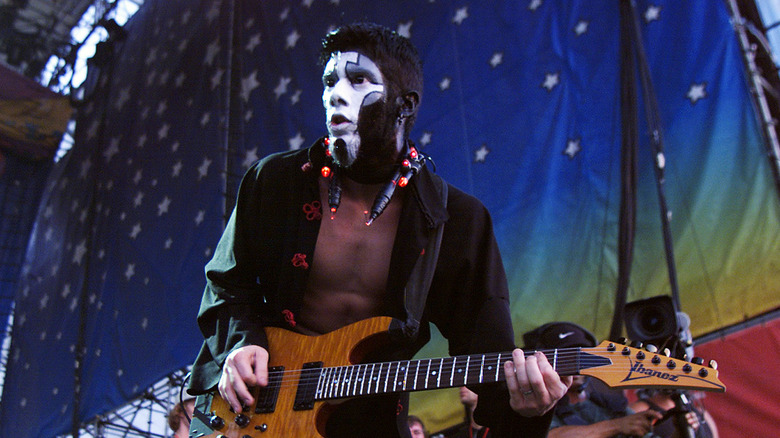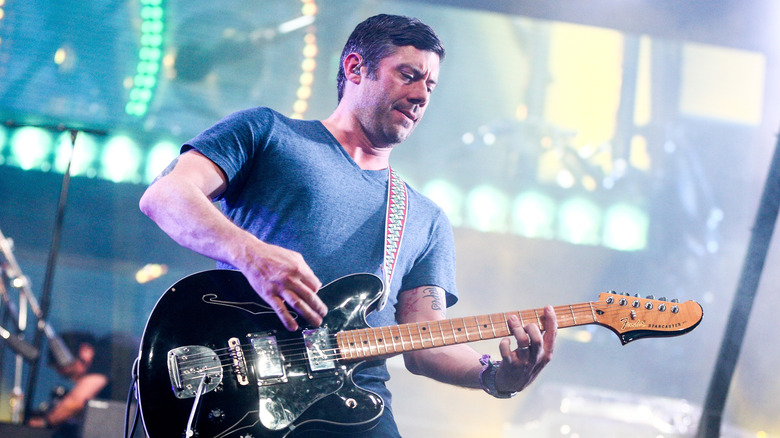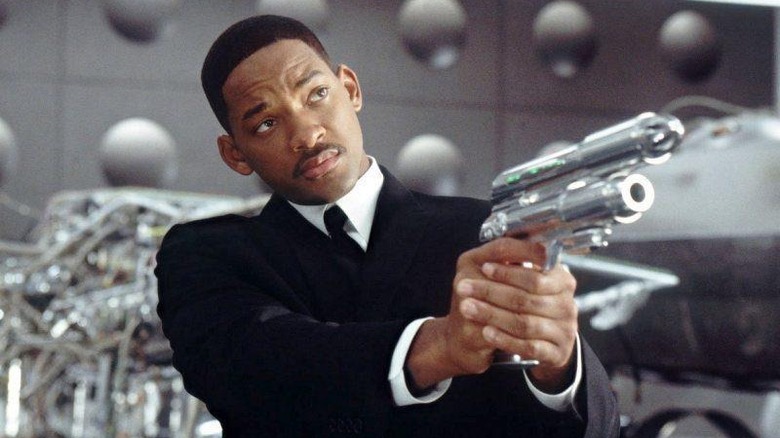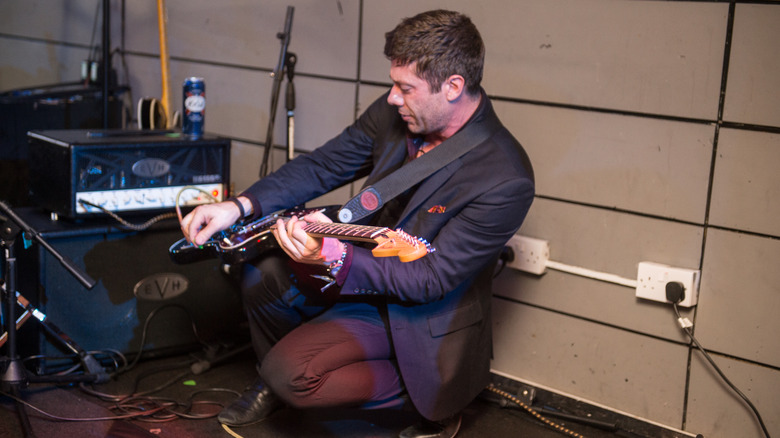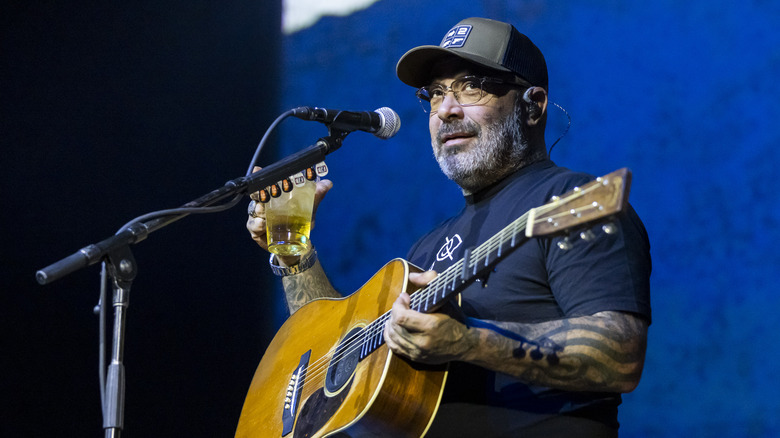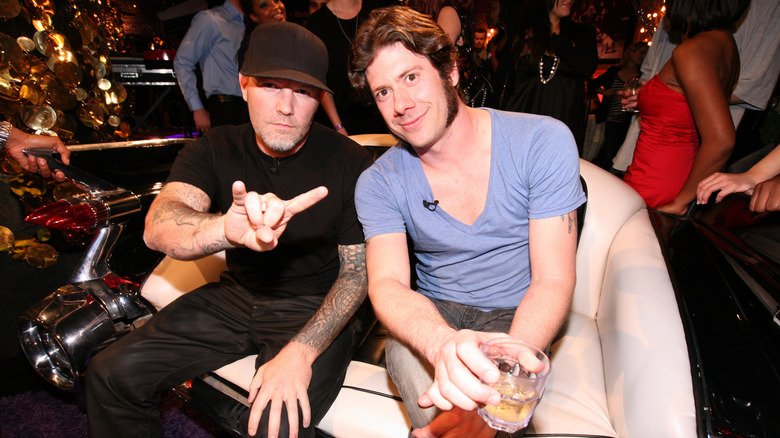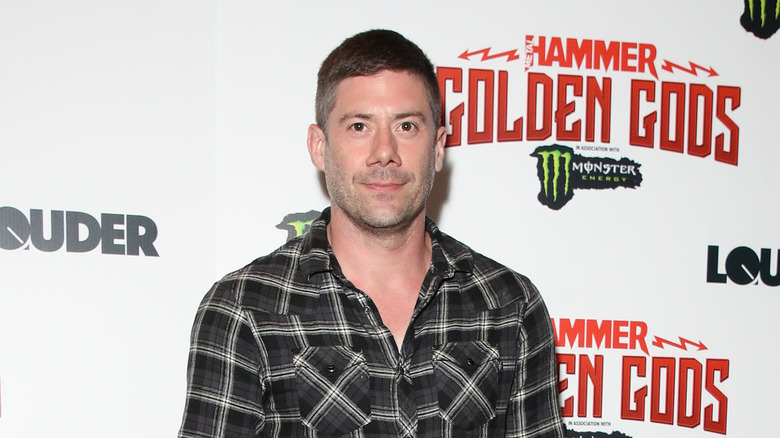The Untold Truth Of Limp Bizkit's Wes Borland
One of life's greatest mysteries is what Fred Durst meant when he said, "John Otto, take it to the Matthews bridge," in the Limp Bizkit track "My Generation." The other is how guitarist Wes Borland fits into this ragtag group of musicians from Jacksonville, Florida, who seem to be the polar opposite of him. Borland has openly admitted there aren't many similarities between him and his bandmates, so it's interesting to see how he fits in here.
For many pundits and music industry professionals, he is seen as the diamond in the rough; the crown jewel of this divisive band. Regardless of how anyone feels about Limp Bizkit as a whole, there is no disputing the nu-metal outfit is far better with Borland than without him. If anyone thinks otherwise, they only need to look at the dwindling fanfare and output when he decided to step away from the Bizkit.
But who exactly is Wes Borland, and why does he still have a complicated relationship with the band that launched his career? Let's get rollin' and find out more about this talented six-string-swinging enigma.
Wes Borland's favorite songwriter is a real symbol
While Limp Bizkit might be considered one of the pioneering godfathers of the nu-metal subgenre, there's no disputing the group is the melting point of hip-hop, grunge, metal, and hard rock. This allows them to easily jump from the bouncing bop of "Rollin' (Air Raid Vehicle)" to the crushing charge of "My Generation" without skipping a heartbeat. Much like other nu metal bands, there are traces of seminal artists such as Faith No More, Living Colour, and Primus in the Bizkit's sound, leading most people to assume they would be natural role models as songwriters for the Bizkit. For Wes Borland, though, he takes inspiration from other genre icons.
Speaking to Songfacts, he listed Nine Inch Nails' Trent Reznor, Fiona Apple, Linda Perry, and Radiohead's Thom Yorke as some of his favorites. However, he reserved special praise for one legendary musician.
"I would say the King isn't Elvis, because he had so many covers, but probably Prince," he said. "Prince is that weird thing where you have an incredible songwriter who's also an incredible showman at the same time. He's just one of those off-the-charts people that makes everything seem effortless. Big Prince fan."
A tragedy made him quit Limp Bizkit for the first time
In October 2001, Wes Borland departed Limp Bizkit. It was a piece of news that no one expected, especially since the band had been riding a massive wave of success that didn't appear to be slowing down. The official statement expressed how it was a cordial split; however, there were rumors flying around about what had really transpired. Later, Borland mentioned how he was no longer musically inspired by the band and how everyone had come to feel more like co-workers, while Fred Durst took shots at his former bandmate on stage.
Borland rejoined the group in 2004, before they went on hiatus, and officially returned in 2009. Nonetheless, there are still questions about his initial departure and what truly led to him leaving the group at its peak. In a 2015 interview with Stereogum, Borland opened up more about this time. He confirmed how there had been a breakdown in communication between him and Durst; however, there was a separate tragedy that pushed him to leave.
Borland said, "And then we played the Big Day Out Festival and had a girl die during our set, which was devastating to me and I still haven't really ever gotten over that, but I was like, 'That's enough. I'm done. I don't like all the attention that we're getting. I don't like that we're on 'TRL.' This is not what I thought being in a rock band would be like.'"
His guitar playing style originated because of a lack of equipment
One of the trademarks of nu metal is down-tuned guitars. It's what gives the riffs a crunching, bassier sound and makes the music even heavier. Wes Borland takes a similar approach in his playing style, but he also plays around with the whammy bar and other areas of his guitar to produce eclectic and vibration-fueled sounds. It's become such a signature of Limp Bizkit that reviewers pointed out how the band effectively lost their soul when the Borland-less "Results May Vary" album was released to — ahem — varied results.
Many critics and fans wonder what inspired this innovative playing style, that's often imitated but never replicated. Was it a case of Borland traveling the world and studying under the tutelage of all the greats, before deconstructing and redefining his own abilities? According to Borland, it was born out of a place of necessity more than anything else.
"The reason I write riffs like that is because I couldn't afford effects pedals when I first started playing," he told Guitar World. "All I had was this Washburn with a licensed Floyd Rose on it and I just started messing around with it more and more." Eventually, Borland realized what he was doing was unique and continued to adapt his sound.
He turned down the chance to appear in a Will Smith music video
As a band, Limp Bizkit has teamed up with a bunch of different artists throughout the decades — from the late Scott Weiland on "Hold On" to Lil Wayne on "Ready to Go." Independently, the band members have also found the time to collaborate on other musical projects or opportunities — for example, Wes Borland has toured with the likes of Marilyn Manson and Nine Inch Nails. However, there are only so many hours in a day, and they have had to turn down sweet gigs as well.
Speaking to NME, Borland discussed one of the strangest offers he received and turned down. "I think the only person I've ever turned down is Will Smith to be in the 'Men in Black II' video." He laughed. "Which was bizarre. He wanted me to play this song and be in the video to one of the movies, and I was like 'No, I can't.'"
While the opportunity to get jiggy with it in a music video for "Men in Black II" didn't materialize, Limp Bizkit — with Borland — landed a seismic team-up with a major Hollywood blockbuster in 2000. The band recorded the smash-hit "Take a Look Around" for 2000's "Mission: Impossible 2" and appeared in the accompanying music video.
Wes Borland wants to score movies and shows
While Limp Bizkit is known for a signature style of music that hasn't really evolved much since the band's inception, Wes Borland has branched out into other genres and spread his wings as an artist. He isn't afraid of starting or reviving older projects as he tries to reinvigorate the creative juices. However, there is an area that he would still love to explore more.
Appearing on the "Drinks With Johnny" podcast, hosted by Avenged Sevenfold's bassist Johnny Christ, Borland said he wants to delve further into the world of composing scores for movies and television. "That's something that I would love to live out in my later days when the shows are over and the time has come, I would love to have transitioned into doing that," he said. "I have done a bunch of scoring and worked with Charlie Klosser, who was the keyboardist for Nine Inch Nails for a long time, on movies."
Borland revealed he had a hand in the scores for the "Saw," "Resident Evil," and "Underworld" movies. He also expressed his adoration for the horror movie genre in particular, and would eventually like to see himself move into this field on a full-time basis.
He is not a fan of Staind's Aaron Lewis
Limp Bizkit has a lot of history with the rock band Staind. After all, it was Fred Durst who gave Aaron Lewis and his bandmates their first big break in the industry by signing them up to Flip Records in 1998. The two groups have been linked in the collective conscience of music lovers as two of the defining bands of 2000s hard rock. Despite his lead singer's hand in helping make Staind a household name, it doesn't appear like Wes Borland has much love for Lewis.
According to Borland's comments on the "Talk Toomey" podcast, he didn't appreciate Lewis' comments after bumping into him at the airport in Florida. Borland explained how he had been visiting his parents and told Lewis he was going back home to Los Angeles, and the Staind vocalist retorted by saying his home is Florida — where Limp Bizkit is originally from — and not L.A.
Borland didn't take kindly to the insinuation and added the following about Lewis: "That guy is such a d***head. So full of himself, such a d***head. I wish nothing but the worst for him. Amen. I could not believe the audacity and just, like, pretentiousness — especially for somebody that acts like they're like a country boy now and they're from Illinois." Lewis fired back at Borland during a concert, allegedly calling him a "bougie mother***er."
He never expected to be a musician
From his unforgettable stage presence to the innovative guitar playing and the eye-popping artwork he has contributed to Limp Bizkit's albums, it's clear that creativity runs in Wes Borland's veins, and that he is an artist through and through. However, even he is surprised at how he ended up becoming a musician, since that wasn't in his plans to begin with.
Speaking to The Believer, Borland explained how his original field of interest lay in fine art, stating: "I went to an arts high school, and had always been interested in sculpture and painting and drawing." Playing guitar was something he enjoyed doing but more as a pastime. At the same time, his interest in art is what inspired him to incorporate the shock rock look of artists such as Kiss and David Bowie into his on-stage appearance.
"When Limp got signed, that changed my aspirations from being in fine art," he said. "Being a musician was the job I didn't expect, and I ended up going, 'How can I incorporate [art into] this?'"
He played with and met Fred Durst at the first Limp Bizkit show
The fearsome foursome of Fred Durst, Sam Rivers, John Otto, and Wes Borland combined their powers to create Limp Bizkit in 1994. Later on, DJ Lethal joined to round off the most iconic era of the band.
Much like many young bands, the path to their first show wasn't as linear or organized as one might expect. Chatting to Metal Hammer, Durst explained how he had first seen Borland playing with another band named Cronk before he joined the Bizkit. According to the lover of red caps and three dollar bills, y'all, the other band members taught Borland the batch of songs they had prepared at the time — but the singer and guitarist weren't acquainted until the actual show day.
"I actually met Wes for the first time at our first gig," he said. "It was wild but it worked. I made up vocals on the spot!"
Wes Borland called ShipRocked 2015 the lowest point of his life
One thing that no one can ever accuse Limp Bizkit's Wes Borland of is keeping his true feelings to himself. At times, his comments have resulted in controversy and making headlines for what he's said, rather than the music made. That being said, he has always faced the hard questions and addressed the proverbial elephant in the room.
In January 2015, Borland posted a humorous message on Instagram, expressing his lack of enthusiasm for the upcoming ShipRocked cruise that Limp Bizkit was a part of, and the kind of crowd who would be in attendance. A year later, he spoke about the event again during an interview with Entertainment Weekly. Needless to say, his recollection of what he called "Bro-chella" wasn't on the pleasant side.
"The lowest point of my life, the ShipRocked cruise," Borland said. "What a waste of time. Anyway, yeah, that was awesome. We had a terrible time and we made zero money off of that."
Trent Reznor was reluctant to have him in Nine Inch Nails
Despite Limp Bizkit rocking its way to the top of the charts and achieving global mainstream recognition, the band developed a negative reputation among its peers. They became whipping boys in the music press, as artists such as Slayer's Kerry King and Eminem weren't shy of letting people know what they thought of the band and their music. Much like Nickelback, it became a sport to hate Limp Bizkit, because everyone else did.
There is another side to this, though: The real-life people on the receiving end of the stick. In an interview with NME, Wes Borland discussed how being in the band has both its positives and negatives. He explained how musicians have been reluctant to work with him since he's so closely associated with Limp Bizkit, citing how the likes of Marilyn Manson and Trent Reznor were all apprehensive of letting him join their bands to begin with.
"Trent Reznor was very cautious about it," Borland said. "He was like, 'I don't know if I want that name being brought up in press about Nine Inch Nails. I don't want to see Limp Bizkit and Nine Inch Nails in the same article.' But he gave me the job anyway."
He feels like an outsider in Limp Bizkit
Take one look at Limp Bizkit's live shows and Wes Borland always sticks out like a sore thumb. He paints his face and body, dresses up in outrageous outfits, and looks like he's having the time of his life. Conversely, in interviews, he comes across as extremely laid-back and far more reserved than the vibe of his manic on-stage persona.
In many ways, he's the outlier of the group — never fitting in with the culture of the Bizkit. Turns out that is an accurate assessment of him in general, as he has confirmed he's largely an outsider among his bandmates. However, as he explained to Metal Insider, he has learned to accept and adapt to their differences after rejoining the band.
"I feel kind of like a tourist in their world sometimes because I don't identify with some of the musical tastes or the culture of some of that world that the other guys are interested in," Borland said, adding how he prefers to focus on what he likes about the band now rather than the aspects he doesn't agree with. "Whether people like the band or not, or whether even I go through times of my likes for the band or not, I truly believe that Limp Bizkit did a bunch of great stuff."
He is involved in an animal rescue project
Throughout the years, Wes Borland has never made a secret of being an animal lover — particularly of cats. In 2018, he spoke to The Hype Magazine about one of the endeavors he had taken up in Detroit, Michigan. He explained how there's a big issue with stray animals in the city, and he and his ex-wife Carré Callaway decided to do something to assist.
"So we tried to get involved in capturing and spaying and releasing," Borland said. "Doing that a lot, and I have come across a bunch of nice cats and raised wild kittens and placed them in homes. I guess we've placed like 150 or 200 cats in homes."
In the same interview, Borland also discussed how his father is a minister and he was also involved in humanitarian efforts when he was younger. That said, his animal rescue project is something where he believes he can see the impact of in real time. "It is not even a dent in the problem," he said, "but I think that for the cats that we come across, they've got much better lives, and they make people happy."


